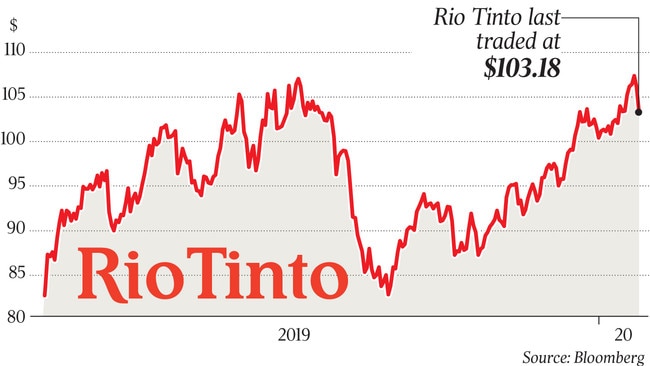Rio Tinto mining big data, AI to bleed ‘desperate’ suppliers
Rio Tinto is reportedly using big data and AI to calculate how much of a cut its suppliers will agree to for prompt payment.

Big data and artificial intelligence are being used to calculate how much of a cut Rio Tinto’s suppliers are willing to take to their invoices in exchange for prompt payment, creating a “product that varies based upon how desperate your supplier is”, according to the Small Business Ombudsman.
The Australian revealed on the weekend that Rio was “aggressively” pushing its so-called dynamic discounting on its 10,000 Australian suppliers — which cuts invoices by about 2 per cent if a supplier wants to be paid within 30 days, delivering savings of up to hundreds of millions of dollars for the cashed-up mining giant.
And its financial services provider has suggested its artificial intelligence services can even help push those suppliers towards costlier financing options.
Rio has partnered with San Francisco-based financial technology firm Taulia, which negotiates discounts on behalf of Rio and uses invoice data from suppliers, combined with external “big data” sources, to work out exactly how much suppliers can be squeezed.
The practice has been criticised by West Australian Premier Mark McGowan and federal Small Business Ombudsman Kate Carnell, and triggered an investigation from the competition regulator.
“The state government’s policy is that suppliers should be paid within 30 days. We believe this is a good template for the private sector,” Mr McGowan told The Australian on Monday.
A Rio spokesman maintains the company has 30-day payment terms for “eligible” suppliers, in line with its commitments to the voluntary Australian Supplier Payment Code.
“We stand ready to respond to any inquiries from stakeholders on our commitment to 30-day payment terms,” the Rio spokesman said.

“We continue to work with our suppliers to improve our services. We are concerned about any reports suggesting we are not meeting supplier expectations. We encourage any supplier to work with us and provide feedback about how our processes can be enhanced.”
But Ms Carnell said the problem with the Australian Supplier Payment Code was that it was voluntary, with no auditing or reporting requirements.
“Rio has been on a radar for a while and they’re really good at saying they’re paying eligible small businesses in line with the supplier payment code. Well, we get feedback all the time that suggests that may not be true,” Ms Carnell said.
“The problem here is a company just signs it and that’s it. Nobody checks whether they’re complying.
“This shouldn’t be that complex. Businesses should just do it. And they shouldn’t be using these sorts of products — reverse factoring products and even worse using AI because then you don’t even have a standard product. You’ve got a product that varies based upon how desperate your supplier is — how ordinary is that?”
Big businesses are collecting significant amounts of information about their suppliers, data that can then be turned back on those same smaller businesses by the sophisticated artificial intelligence and machine learning tools deployed by Taulia and its competitors. Many suppliers have complained about big resource companies’ habits of asking them to itemise their costs — up to and including a profit margin — giving their biggest customers an unparalleled insight into the inner workings of their business.
“Let’s say we were quoting $90 an hour. We had to break that $90 an hour down into superannuation guarantee, company payroll tax, workers compensation, other insurances, long service leave, management and admin, uniforms and PPE and so on and so forth. Then the last one on the list was ‘profit margin’,” one supplier told a parliamentary committee.
The practice is not uncommon, nor necessary unreasonable, given supply chain risk is a significant consideration for major companies and separate laws covering such issues as modern slavery may also require audit trails.
But what is new is a service provider offering to use that data, and match it to external “big data” sources to work out exactly how much suppliers can be squeezed.
In its pitch to potential clients such as Rio, Taulia touts the benefits of machine learning and artificial intelligence to work out what discounts suppliers will be prepared to accept — including an analysis of the supplier’s own borrowing costs to work out what discount they might be prepared to wear in order to access early cash.
In a “specialist article” published on Taulia’s website, Taulia data insight boss Vincent Beerman suggests using a company’s own payment data, plus information on market borrowing rates, and “big data from external sources” to work out how much of a discount any individual supplier may be prepared to take.
But Mr Beerman suggests that the data and Taulia’s systems can also be used to decide which suppliers can be pushed into using more expensive supply chain financing options, such as that provided by controversial globalfinancier, the Australian-born Lex Greensill.
“It is clear that the insights provided by AI and machine learning need to translate into action in order to realise cash benefits,” Mr Beerman wrote.
“This might mean turning off dynamic discounting offers at certain times, or better yet moving suppliers from dynamic discounting to supply chain finance terms in order to continue supporting suppliers working capital needs. Once buyers understand the different levers available to them, and the impact of pulling these levers to varying degrees, they will be able to gain far greater control over their program.”
Ms Carnell said such behaviour was leaving governments little choice but to introduce more regulation and laws against the practice. “At the end of the day, more and more, there is capacity for big businesses to find new and more exciting ways to screw small businesses,” she said.
“This sort of behaviour from big companies like Rio … are creating a situation where the only choice is legislation; more red tape.”
Do you know more? lynchj@theaustralian.com.au

To join the conversation, please log in. Don't have an account? Register
Join the conversation, you are commenting as Logout